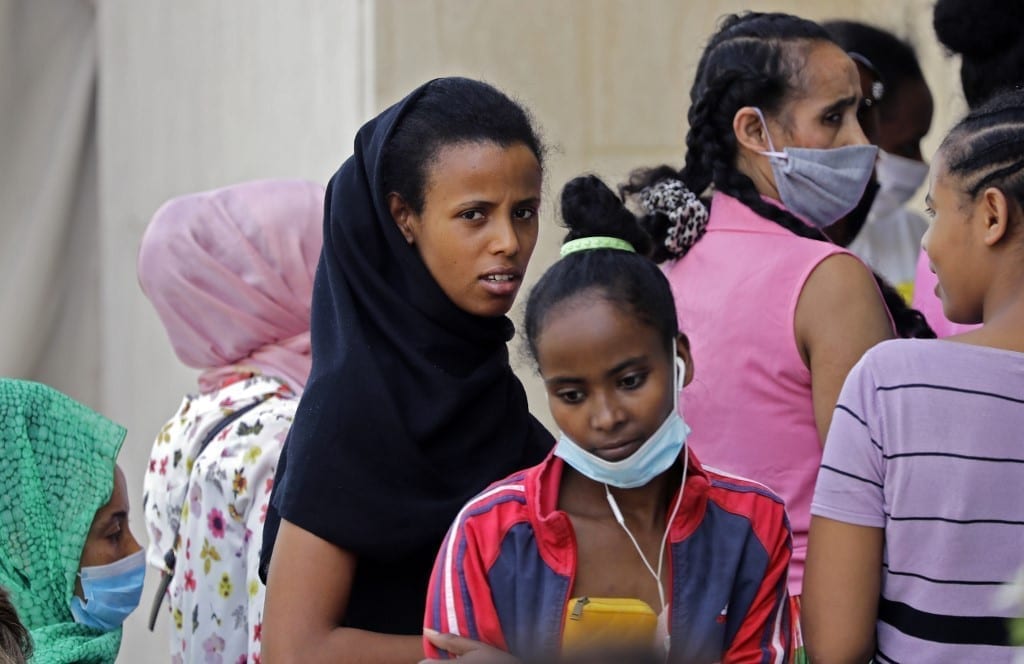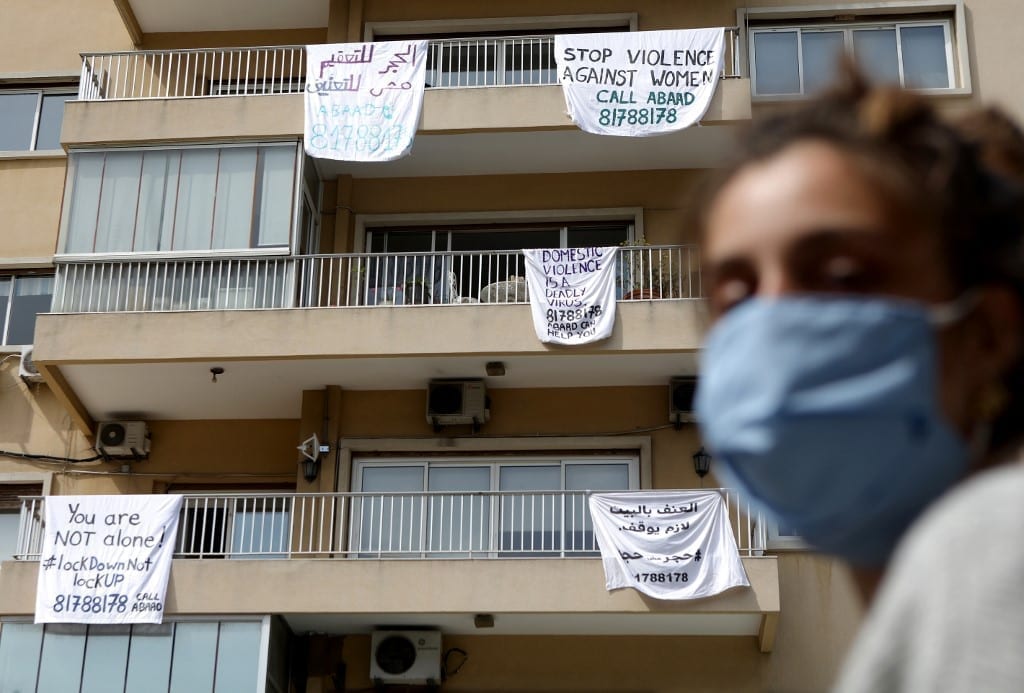“All these women used to work at Madams houses, look at them thrown here, like garbage! A human being has dignity! Just wait until the airport opens!”
The frustrated screams of an Ethiopian migrant domestic worker into an LBC reporters microphone sets the scene of an occurrence that retrieves its dreadfulness from it’s painful likelihood. Like a nightmarish math equation, calculated at the hands of countless heartless and racist Lebanese families, one inputs the most marginalized communities in addition to an economic crisis, and the result is a crowd of Ethiopian migrant domestic workers, clutching their scarce belongings on the streets outside of the Ethiopian embassy in Lebanon.
In the midst of a global lobbying in support of the black lives matter movement in the United States, Lebanon learns that dozens of Ethiopian migrant domestic workers had been abandoned outside of their consulate by their employers, many having not been paid in months, and stripped away of their passports. This came to the backdrop of over a week of protests by Ethiopian migrant workers, objecting the outrageously excessive prices of airplane return tickets to their country, which is said to have capped at 680 USD.
The Labor Ministry, headed by Labor Minister Lamia Yammine, has since done the bare minimum and sent in two buses to transport the workers to a hotel in Ain Mreisseh, only once the issue had received national attention, after they had been on the streets near the consulate for over a week. Until this moment no efforts have been made to resolve the airplane ticket prices issue, nor has there been any talk of reprimanding the inhumane employers who had abandoned them in this horrifying manner.
On the streets of Arab cities, those with black skin are an aching minority. In many Arab homes, the word “abeed” (slave) is still used to refer to people of color, and is often associated with a lower class, migrant domestic worker.
Kafala
As African Americans chant against the dangerous systemic, racist narrative that has remained in place even after the abolishment of slavery in the US, the Arab region wiggles uncomfortably in the background, it’s hands dirty with the shameless implementation of what has been rightfully dubbed the world’s foulest modern-day slavery system: the Kafala system; the system under which all of the Ethiopian workers outside of the consulate had been employed. The Kafala system emerged in the 1950s, and is still flourishing around the Arab world, in the GCC, Jordan and Lebanon. One does not have to dig too deep to understand where the injustices lie under Kafala, for at every corner the racist rules reveal themselves brazenly and blatantly.

Lebanon is home to over 250,000 migrant domestic workers, all excluded from the Lebanese Labor Law and governed instead by Kafala. Kafala is a loophole that allows for all kinds of excruciating exploitation, including confiscating their passports, working long hours, no vacation days, restrictions on mobility and communication, and forceful poor accommodations. These are all examples of the least horrifying options, where in severe cases, which are painfully common and not an exception, it also allows the space for verbal, psychological, physical and sexual abuse, with no repercussion for the employers. Lebanon houses one of the highest rates of migrant domestic worker suicides and deaths, when just last month the case of Faustina Tay, an employee whose body was discovered in a car park under her employer’s home, garnered international attention.
As the world watches the events of the protesting in the United States unfold, Arabs have demonstrated a couple of distinct attitudes as a reaction, both somehow from a position of distance, either feebly showing their support on social media or disregarding the occurrences as unrelated to their lives. Many activists have since been demanding that the support for the black lives matter movement should correlate to the racism against people of color in our context, which is to a giant extent rooted in the fact that we are yet to abolish this horrifying system.
The setting was solemn as over a hundred silent protestors carried candles in a vigil organized both to commemorate George Floyd and take a stance against Kafala, outside of the American University of Beirut in Lebanon on June 4th.
Claudia Youakim, an American-Palestinian University Professor, looks grave as she explains why she had a hand in arranging the vigil, “I see this as an extension of the October revolution, we also need to speak up here about the Kafala system and the unjust treatment of people of color here…black lives matter is a global movement and we need to be part of it. Despite being in a pandemic, the real pandemic is racism.”
Lama El Amine, a Lebanese activist who’s video response to Tania Saleh, a Lebanese public figure who committed the ridiculously ignorant crime of adorning black face as ‘support’ to the black lives matter movement, entitled ‘Dear Tania Saleh, I have a dream…” had gone viral a few days back, was present at the vigil.
Clutching a sign reading “My revolution is against the racist in my country”, she mournfully explains to Daraj, “This monstrous system… so many women come here to work, thinking they will be treated with dignity. It’s is very ugly, for them to return to their country, raped, violated, broke, humiliated, and cursing the second they arrived to Lebanon.”


Society and Beauty: Racism Bleeds Into Everything
I remember the first time I was made aware of the anti-black racism that runs rampant in Arab society, a problem I thought belonged far away in America, taught to me by Western news and movies. It was 2008, and I’d been flipping the channels on our television set in Syria, when I stopped at the Oprah Winfrey show that was broadcasting on MBC 4. I was about to set the remote aside, when my grandmother aggressively asked me to change the channel, “I don’t like watching this show. Abideh (slave). She looks like an ape.” Her voice still rings in my ears today; a Syrian woman, in her 70s, dismissing the most powerful American talk show host of all time, because of the color of her skin, because she was black.
Anti-black racism is made most obvious when one takes note of the beauty standards in the Arab world. Our colonized history bleeds into the attitudes we pertain towards what we consider beautiful, and what we consider ugly. Whiter skin, glamorized by products like fair and lovely is encouraged and praised, and blonde hair is considered a bonus, particularly when it comes to women. In Arab television shows and music videos, a young, fair skinned, blonde woman is accompanied with exaggerated drooling on part of the men she interacts with. To this day the Arab men who visit Europe gawk over these colors, and the one who marries a woman with this combination is hailed as having successfully attained the optimal genetic combination.
I still remember a joke the teenagers in my school used to crack, when we would discuss how unjust it was that our fathers had a say in whom we chose to marry. “One day, I’m going to somehow find a man with this combination: both black and Jewish, and bring him home. I think my father would have a heart attack!” The frank reality that these words illustrate is one that is undeniably and irrevocably spread in the Arab world. Even the Arabs who hail themselves as open-minded, allowing their daughters to roam free without the constraints of religion or gender, would refuse her marriage to a black man, and the same for their son to a black woman; that is the one line most of them would not cross. There would be no hesitation if she had met a young white American however, but rather celebrations for the prestige and passport this will bring as a bonus to the family.
On the streets of Arab cities, those with black skin are an aching minority. In many Arab homes, the word “abeed” (slave) is still used to refer to people of color, and is often associated with a lower class, migrant domestic worker. There is an odd hatred, almost a colonial thought passed down towards us, to harbor negative thoughts towards those of a different color.
100 Steps Back
The impact the US has on the rest of the world in its thoughts, struggles, and content is unparalleled, and the Arab world’s reaction to the burst of riots based in African-American race struggles is no different. Still it is incredibly disheartening, to see those angrily expressing their solidarity with the US at the moment, but who wouldn’t speak a word towards migrant domestic worker justice. Those who agree that the African-American struggles are painful and unjust, but would never approve the marriage of their children to a black person. It is terrifying to think, that it seems with all the chaos and horrifying anti-black racism rampant in the US, they still remain 100 steps ahead of the Arab region in the resolving the disturbing matter.






